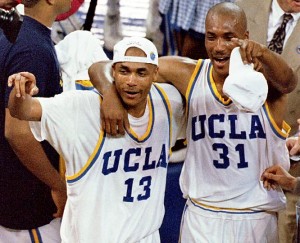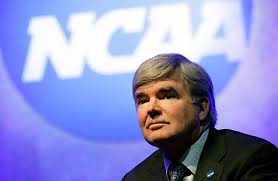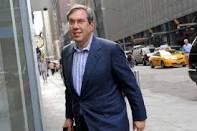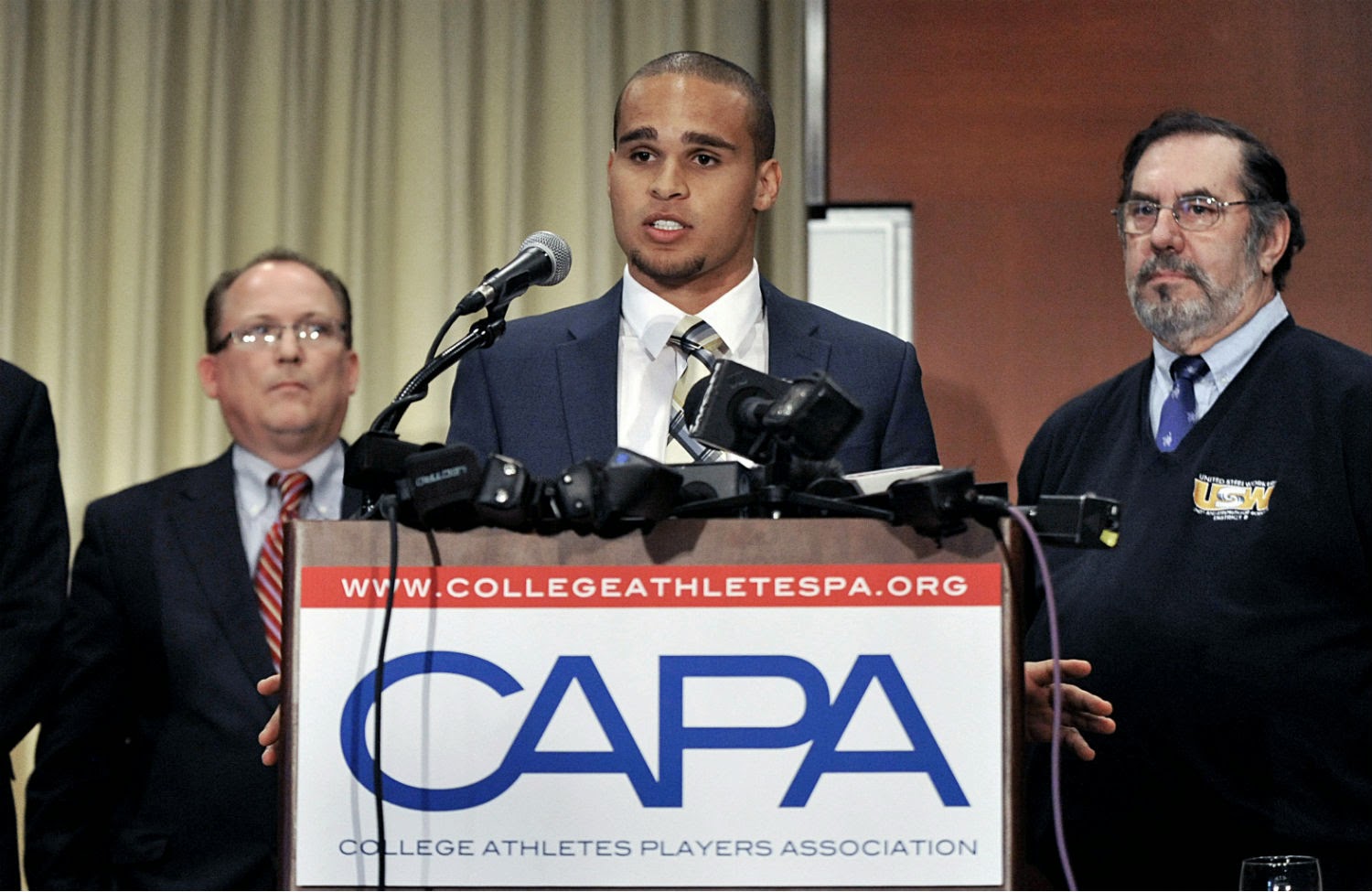The question of whether college athletes should be paid or not for their athletic muscle has been a long on-gong debate, one that seems to soon be coming to a conclusion. The NCAA and its universities have gotten away with not paying college athletes forever by maintaining that college sports are not professional but amateurism which is the reason why they should not be paid and the reason they have not been subject to anti-trust violations. But over the last year there has been major challenge to the NCAA system which could change things dramatically forever.
The most serious threat for the last few years to the NCAA model has been a court case brought against the NCAA and Electronic Arts by former college basketball player Ed O’Bannon. O’Bannon who played and starred alongside his younger brother Charles at UCLA in the mid 1990’s was named NCAA tournament Most Outstanding Player of the 1995 tournament when O’Bannon and UCLA won the National championship. The Ed O’Bannon lawsuit was triggered in Ed’s head when he was playing a video game one day and saw that his likeness from that 95’ team was being used in the game along with the likeness of many other former and current student athletes. O’Bannon first filed the lawsuit all the way back in 2009 and after years of legal maneuvering to delay the process the trial has finally gotten underway. Initially O’Bannon’s suit was filed on behalf of former college athletes whose likeness is used on Electronic Arts video games but judge Claudia Wilken who presides over the case has allowed for the lawyers of the players to amend the case and include current college athletes as well which could lead to college athletes seeing some kind of compensation possibly as early as this upcoming season, but first there are further legal proceedings that need to take place.

Ed O’Bannon (right) and Charles O’Bannon (left) starred together in the starting lineup for the 1995 NCAA champion UCLA Bruins.
One key development in the case occurred months before the start of the June 8th Ed O’Bannon trail when the co-defendant in the case– Electronic Arts sports– settled with O’Bannon’s side out of court in September for $40 million dollars, though the settlement has not been implemented yet thus the money has yet to be divided up and distributed out to anyone. However the fact that EA Sports would settle out of court for $40 million is a concession that they believed they would not have been able to win in court which is what the NCAA is trying to do now as they are the sole defendants on the case now that EA Sports has settled.
One of the key documents being examined among the many in the Ed O’Bannon vs. the NCAA trail is a six page, seven part agreement by the name of NCAA form 08-3a. This form requires seven signatures from every scholarship athlete before the start of every season. Part IV of the document states that : the athlete “authorize(s) the NCAA (or a third party acting on behalf of the NCAA) to use your (the athlete’s) name or picture to generally promote (sic) NCA championships or other NCAA events, activities, or programs.” O’Bannon and his lawyers are trying to make the case that this form violates antitrust laws by denying these college athletes the right to collect financially on their images and likeness.
The lead attorney on the O’Bannon/Players side is Michael Hausfeld and he is asking the judge for an injunction that would stop the NCAA from continuing to use form 08-3a which would open the door to the possibility that college athletes for these Major collegiate sports programs could get paid and profit off their likeness being used in video games and other commercial purposes. The NCAA of course is arguing that the idea of amateurism will be destroyed if student athletes are allowed the freedom to market and profit from their names. So not only is it possible that many former players, like O’Bannon, will win a court decision that orders the NCAA to pay these players for the use of their likeness over the years but it is also possible that current college players could profit off their likeness with the extinction of form 08-3a. So we have to stay tuned to these fast developments as a resolution in the case could come within the next few days.

This man Mark Emmert is the head of the NCAA and continues his arguments for why college athletes should not be paid during the Ed O’Bannon versus NCAA case which is taking place right now.
Jeffery Kessler also argues that these student athletes could draw offers in excess of the tuition, books, and room and board that their scholarship cover if they were set free onto the open market. Like in professional sports if collegiate athletes were able to put their services on the open market they would have many universities bidding for their services and they would be able to garner salaries that well exceed what their scholarships and room and board cost. Kessler is asking the judge for an injunction against the NCAA which would put a stop to a cap on the earning potential of a player in what should be a free & open market because a cap should be illegal. A decision in favor of the players when there is a resolution in this case could also lead to players getting paid soon.
There are two other major developments on the NCAA pay for play movement. One is a pending review by the National Labor Relations Review Board in Washington D.C. on whether or not the student athletes at Northwestern can be considered employees, not amateurs and whether or not they should be able to form a union after the NLRB’s regional director in Chicago ruled in March that the school’s athletes are employees and allowed to vote on whether to form a union. That vote came at Northwestern in the middle of April amidst reports that there were some inside of the University who were trying to talk the Northwestern football players out of voting YES for a union which if ratified by a large enough percentage of the vote would grant Northwestern athletics with the first student athlete union in college sports. The University however challenged the regional director’s ruling in Illinois and that decision is now being reviewed by the Full National Labor Relations Review Board in D.C. so the results of that April vote have been sealed and will not be released until the review board makes its decision and possibly longer than that as Northwestern has options to fight a losing decision in court if one is handed down which would delay the outcome of the union vote even longer.
Issues that the Northwestern athletes want to fight for through the formation of a union are more than just monetary payments and also include: not being stuck with sports-related medical bills, athletes not having to lose their scholarships because of an injury, decreasing the degree of players being subject to unnecessary brain trauma, proper working conditions during practice and workouts, and better opportunities to complete their degree.
Another major development brewing Is occurring not too far from the NLRB in Washington D.C. A couple miles away on Capital Hill in the house of representatives there is legislation that has support amongst both democrats and republicans that might bring an end to the ban on paying college athletes along with other possible reforms. The bill is known as H.R. 2903 and two of the bill’s lead supporters are Representative Charlie Dent (R., Pa.) and Representative Joyce Beattie (D., Ohio). Representative Joyce Beattie has said “this reform is long overdue.”
As I stand this is a great moment in college athletics as it appears that it is only a matter of time until college athletes are being paid. The amount of money that the NCAA and the universities make through huge national and regional television contracts, reaching the NCAA tournament, reaching college bowl games, player merchandise, and ticket sales are astronomical and continuing to rise at historic numbers. We are now at the point as multiple reports state that each of the major conferences are taking in over $1 billion annually.
There is no doubt in my mind that college athletes should be paid and it should have happened a long time ago. Consider that these athletes have a fulltime academic schedule and a fulltime practice schedule with a game every Saturday in the fall. Then these athletes are covered by the media, which creates tremendous pressure, as heavily as professional athletes and when they don’t do well they are criticized like pro athletes on these wide ranging media platforms. Professional athletes have the money to just brush harsh media criticism aside because that is why they get paid. College athletes however get the harsh criticism along with the pressure and are not paid a dime.

Jeffery Kessler is an attorney who has fought many an anti-trust case and come out on top in favor of the players. Now he is a problem for the NCAA.
It is clear that certain sports are the ones that generate most of the billions of dollars that are being generated and that is the Men’s college football and basketball so those are the athletes that should be paid without a doubt because the other sports in the Universities are not brining the school much revenue at all if any so there is no reason for anyone to act like all of a school’s athletic program is generating big dollars when it is really just a small percentage. No, it is only the Major football and basketball programs for the most part and the money should be distributed accordingly. Another final thought is that before free agency came to baseball many of the owners spoke about how free agency would ruin the game. We hear similar talk now from the NCAA about how a union and paying student athletes will ruin college athletics. We see that free agency far from ruined baseball and actually enhanced it. It will be fascinating to see how the NCAA will be transformed over these next few years.
